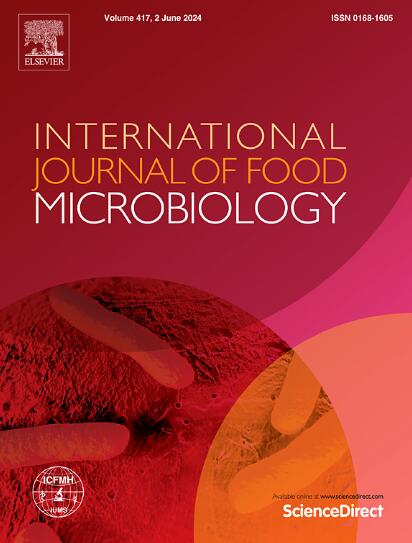加入丁香精油的玉米淀粉冷冻剂对抗微生物空肠弯曲杆菌的抗菌活性:在肉鸡肉包装中作为吸收垫的应用
IF 5.2
1区 农林科学
Q1 FOOD SCIENCE & TECHNOLOGY
International journal of food microbiology
Pub Date : 2025-08-13
DOI:10.1016/j.ijfoodmicro.2025.111391
引用次数: 0
摘要
空肠弯曲杆菌是人类弯曲杆菌病的主要病因。这种疾病主要与食用未煮熟的肉鸡肉或与肉鸡肉、肉鸡渗出物或肉鸡包装交叉污染有关。本研究旨在评价丁香精油(CEO)对耐抗菌空肠杆菌的抑菌活性,并将该化合物加入玉米淀粉低温凝胶中,模拟肉鸡肉包装的环保吸收垫。CEO对空肠梭菌有一定的抑制作用,各菌株的最低抑菌浓度和最低杀菌浓度差异较大(0.15 ~ 0.59 mg·mL−1)。分别用0、10和30% (v/w)的CEO制备玉米淀粉冷冻液,样品形貌均匀,平均孔径约为143 μm,孔隙率高,吸收率高。在受污染的肉鸡肉上进行的实验表明,该冷冻液具有抗弯曲菌活性,在42°C的微空气条件下,24 h的空肠梭菌数量减少了~ 3.6 log10 CFU·g−1,在4°C的空气条件下,48 h的空肠梭菌数量减少了~ 1.3 log10 CFU·g−1。CEO冷冻液还吸收了肉鸡肉渗出液,有效地消除了空肠梭菌污染。在两种测试的储存条件下,在对照冷冻凝胶(不含CEO)中保持8-log10 CFU·g−1。体外培养的CEO具有抗弯曲菌活性,且CEO冷冻液能显著抑制肉鸡肉及其渗出液中的空肠弧菌。因此,CEO冷冻机有潜力用于食品工业,以确保食品安全,提供一种环保和有效的替代方案,通过活性包装减少空肠杆菌污染。本文章由计算机程序翻译,如有差异,请以英文原文为准。
Antimicrobial activity of corn starch cryogels incorporated with clove essential oil (Syzygium aromaticum) against antimicrobial-resistant Campylobacter jejuni: application as an absorbent pad in broiler meat packaging
Campylobacter jejuni is a major cause of campylobacteriosis in humans. This disease is mainly related to the consumption of undercooked broiler meat or cross-contamination with broiler meat, its exudate, or packaging. This study aimed to evaluate the antimicrobial activity of clove essential oil (CEO) against antimicrobial-resistant C. jejuni and to incorporate this compound into a corn starch cryogel, simulating an eco-friendly absorbent pad for broiler meat packaging. The CEO showed an inhibitory effect against C. jejuni with the minimum inhibitory concentration and minimum bactericidal concentration varying between isolates (0.15–0.59 mg·mL−1). Corn starch cryogels were produced with 0, 10, and 30 % (v/w) of CEO, exhibiting homogenous morphology with a mean pore size of approximately 143 μm, high porosity, and significant absorbent capacity. The cryogels showed anti-Campylobacter activity when tested on contaminated broiler meat, resulting in a ∼ 3.6-log10 CFU·g−1 reduction in C. jejuni count under microaerophilic conditions at 42 °C for 24 h, and ∼1.3-log10 CFU·g−1 reduction in C. jejuni count under aerophilic conditions at 4 °C for 48 h. The CEO cryogels also absorbed broiler meat exudates, effectively eliminating C. jejuni contamination, which remained >8-log10 CFU·g−1 in the control cryogel (without CEO) in both storage conditions tested. The CEO has anti-Campylobacter activity in vitro, and CEO cryogels significantly inhibit C. jejuni in broiler meat and its exudate. Thus, CEO cryogels have the potential to be used in the food industry to ensure food safety, offering an eco-friendly and efficient alternative to reducing C. jejuni contamination through active packaging.
求助全文
通过发布文献求助,成功后即可免费获取论文全文。
去求助
来源期刊
CiteScore
10.40
自引率
5.60%
发文量
322
审稿时长
65 days
期刊介绍:
The International Journal of Food Microbiology publishes papers dealing with all aspects of food microbiology. Articles must present information that is novel, has high impact and interest, and is of high scientific quality. They should provide scientific or technological advancement in the specific field of interest of the journal and enhance its strong international reputation. Preliminary or confirmatory results as well as contributions not strictly related to food microbiology will not be considered for publication.

 求助内容:
求助内容: 应助结果提醒方式:
应助结果提醒方式:


